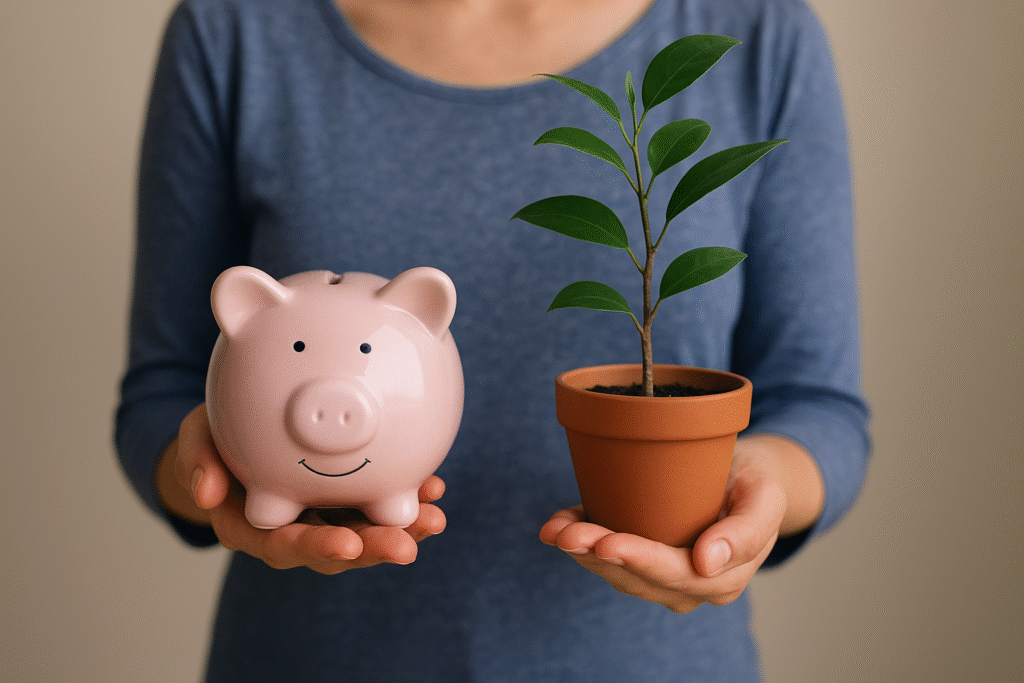
Ready to Save More Money This Year? Here’s How to Get Started.
Every January many people promise themselves — “This year, I’ll finally save more.” But then life happens. Rent goes up. The car breaks down. Your cousin has a wedding. Suddenly, you’re back at square one, wondering where your money disappeared.
Saving can feel like trying to catch water with your hands — it keeps slipping through your fingers. But here’s the truth: saving money isn’t about luck or iron willpower. It’s about systems, habits, and a little creativity.
And once you nail those down, saving becomes less of a chore and more of a game. In fact, with the right approach, you’ll start to enjoy it.
So if you’re ready to move beyond “good intentions” and actually grow your money this year, here are 20+ practical, proven tips to get started. Pick one today, and watch your confidence (and your savings balance) grow.
Why Save in the First Place?
Saving isn’t about denying yourself lattes or living miserably. It’s about creating space for the life you want.
Escape the paycheck-to-paycheck treadmill.
Crush debt that’s been weighing you down.
Transition smoothly if you ever move to one income.
Fund that dream trip, wedding, or new home.
Build a cushion for emergencies.
Start investing for your future.
Saving = freedom. It’s the difference between reacting to life and directing it.
Surprising, and Sometimes Extreme Savings Moves
Think you’ve seen every savings hack? Try these:
Cut your own hair (or rock the buzz cut).
Swap food name brands for shop labelled brands — most taste exactly the same.
Move in with family short-term to fast-track your debt payoff.
Freeze water bottles to stay cool instead of cranking up the AC.
Not all of these will fit your lifestyle, but even one bold move could free up thousands.
Pack Your Lunch
The average person spends $8–$12 a day on lunch. That’s $264 (R1500) a month! Packing leftovers or meal-prepping can save you hundreds while keeping you healthier.
Open a High-Yield Savings Account
If your money sits in a bank account earning 1% or less, you’re leaving money on the table. Look for online banks or other savings accounts offering 4% or more. It’s passive income — interest that grows while you sleep.
Cut the Cord on Cable
Cable costs are creeping past $70 (R700) a month. Streaming is cheaper. And honestly, so is spending less time glued to a screen.
Embrace Simplicity
Minimalism = fewer temptations. Declutter your home, unsubscribe from store emails who want to sell you something you don’t really need, and limit screen time. Less clutter in your life means less clutter in your budget.
Start Investing Early
You don’t need to be rich to invest. $100 (R500) a month into an ETF or TFSA (Tax free savings account) can snowball into hundreds of thousands over decades. The earlier you start, the more time you give your money to compound.
Pause Before Making Purchases
Impulse and emotional buys are sneaky budget-killers. Before buying something, ask yourself:
Do I need this?
Could I wait 24 hours before deciding?
Can I borrow or rent instead?
Often, the urge to buy at that moment fades — and your money stays put.
Check Your Credit Score (For Free)
Don’t pay to check your credit score. There are companies offering free apps or annual credit reports to stay informed (Experian, Experian SA). Plus a good credit score means lower interest rates when you need to borrow money for bigger purchases like a home or car, saving you thousands over the term of the purchase agreement.
Travel for Cheaper
If you’re disciplined, credit card rewards can mean free flights and hotel stays. The catch? Always pay the balance of your credit card in full. Otherwise, the interest charged eats away the rewards.
Meal Planning = Money Planning
On average households waste 40% of their food. By planning meals, shopping with a list, and cooking in bulk minimizes waste and saves money in the long run.
Slash Your Cell Phone Bill
Consider switching to a lower-cost provider like Republic Wireless, with plans starting at just $15/month. You could save thousands every year without sacrificing quality.
Say Goodbye to Timeshares
Timeshares are rarely the bargain they seem. Annual fees, limited resale value, and inflexible bookings make them a costly trap for many. If you’re stuck with one, explore your options for exiting—and avoid purchasing new ones.
Related content:
Quit Smoking (and Save Your Health)
Smoking is expensive. A pack-a-day habit can cost up to $450 (R1085) a month. Plus, smokers earn on average 20% less than non-smokers. Quitting isn’t just a health win — it’s a financial one too.
Create (and Stick To) a Budget
Think of your budget as a money GPS. Without it, you’re driving blind about your finances. With it, you’ll know exactly where you’re going and track your spending. Download a free printable or Excel spreadsheet budget to get started.
Build Passive Income Streams
It could be rental income, dividends from shares, or even a side hustle like selling digital products. Passive income can free up your time and diversify your finances.
Drive a Car You Can Afford
Car payments are one of the biggest drains on peoples’ budgets. Aim to spend less than 10-15% (including insurance and maintenance) of your monthly income on car expenses.
Turn Saving Into a Game
Challenge yourself or friends to a monthly savings contest. Use tools like savings trackers or inspiration boards to visualize your progress and keep motivation high.
Energy Hacks
Use a Programmable Thermostat or Go Solar. Automatically adjust your home’s temperature to save on energy bills. Many models or solar systems pay for themselves in just a few months.
Pay Off Debt Faster
The quicker you pay off debt, the less you’ll pay in interest—freeing up cash for your goals.
Eat Out Less
Cutting just one restaurant meal per month can save hundreds each year. Track your dining out habits and set a realistic limit.
Cancel Unused Subscriptions
Gym memberships, streaming, meal kits, magazines—all these add up fast. Audit your subscriptions and keep only what you truly use.
Save on Groceries
Shop with a list, avoid shopping hungry, and skip pre-prepared foods. Look for sales and sign up for store loyalty programs. Your wallet will thank you.
Negotiate Your Insurance Rates
Shop around for car and home insurance annually. Adjust the coverage and ask your agent about discounts—you could save hundreds with a single phone call.
Build Your Emergency Fund
Aim to save 3–6 months’ worth of your monthly expenses. An emergency fund prevents debt when life throws you a curveball.
Buy a Water Filter
Stop buying bottled water—invest in a filter and save $100 a year or more.
Downsize Your Home
A smaller house means a lower mortgage/bond or rent, taxes, insurance, and maintenance. Don’t pay for space you don’t need.
Stop Keeping Up With the Joneses
Social media makes comparison easy—but remember, you don’t see others’ debt. Focus on your own goals and values.
Saving money isn’t just about sacrifice—it’s about creating freedom, peace of mind, and the life you truly want.


